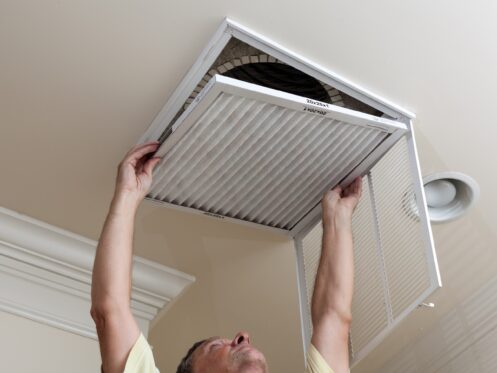You and your family spend most of your time during the year inside your home. It’s essential to protect your health by maintaining your indoor air quality year-round. Low air quality can wreak havoc on your physical and mental health as well as your monthly costs. Your residence may be struggling with pollutants from your combustion gas appliances, cleaners or even your new furniture and rugs. Here are a few helpful indoor air quality hacks to try out this summer.
Stop Smoking Indoors
Smoking inside your home does more than leave an unpleasant lingering odor. Along with yellowing your walls and belongings, it can also allow cancerous chemicals like benzene, lead, formaldehyde and more to stick around in the air for days. Rooms that have been smoked in often have dangerously high levels of air contaminants compared to other parts of the home. Firsthand and secondhand exposure to cigarette smoke can put your household at risk of various heart and lung diseases.
Switch Air Filters
Start the new warm season with a new HVAC air filter. A dirty or clogged filter lets more contaminants into your breathing air, which can worsen your health conditions and leave you perpetually uncomfortable. Too much dust, hair and debris will cause frequent sneezing, coughing and eye and throat irritation. If you regularly struggle with unexplained health symptoms, consider upgrading your filters to a pleated variety or ask our local HVAC team about whole-home air purification systems for improved filtration.
Take Certain DIY Projects Outside
Summer is the time for planning exciting new home projects like painting your cabinets or replacing your carpets. Unfortunately, indoor remodeling activities that require construction, painting or demolition can release harmful chemicals. Even if you ventilate the area and leave the windows open, you could be allowing drywall dust and other dangerous debris into your vents and ductwork. The best alternative is to take all of your extensive projects outside of the home. If you have to work inside, be sure to block off your registers and make sure your HVAC is off. When you’re done, call for a professional indoor air quality test to check for chemicals like ammonia, phenol or radon.
Choose Safer Cleaning Products
Some cleaning products are harmful both to your health and the environment. Proper ventilation is key to keeping your home free of contaminants. You should also try to opt for products that are approved by the Green Seal, or another third party that provides credible eco-friendly certifications. Just because a cleaner is marketed as organic or green doesn’t necessarily mean it won’t harm your air quality. Additionally, it’s key to follow all usage guidelines on the bottle and avoid mixing cleaners or chemicals that could create dangerous reactions.
Buy an Air Purifier
Air purifiers are a great way to keep your air quality consistently healthy without breaking the bank. It can be hard to protect your home against seasonal changes and low local air quality indexes. Air purifying systems keep your home’s entire air supply clean. While your HVAC filter will pull larger contaminants like hair and dust, an air purifier works more efficiently to remove microscopic spores, mites and more. Popular examples of air purifying systems include UV or germicidal lights, electronic cleaners, HEPA filters and those that use activated carbon.
Use Exhaust Fans
Cooking, showering and running hot water allow excessive amounts of water vapor into your home. In addition to impacting your humidity level, cooking lets grease and other food particulates coat your walls and create nasty odors. In some cases, your stove or fireplace may even emit natural gas and other irritants like nitrogen oxide. You should run your kitchen exhaust fan before, during and after cooking. Using your bathroom fan when you shower or bathe will pull out moisture before it settles and leads to issues like mold or mildew.
Dust Regularly
The dust in your home is an accumulation of contaminants like dirt, pollen, dead skin cells, mites, insects and more. Improving your regular cleaning habits can keep particulates from building up on your tables, shelves and blinds. It’s best to dust at least once a week to stop dust from reaching your HVAC filter and system. Routinely launder your curtains and rugs, and try to use allergen covers for your furniture and mattresses. Too much airborne debris can result in you using up more air filters over time and requiring more HVAC maintenance to combat the excessive wear and tear.
Minimize Pet Allergens
Pets are significant contributors to your air quality. Furry animal companions are full of hair, dander and contaminants they picked up from outside. When they walk around your home, they leave behind debris like feces, urine, insect droppings and dirt. The more pets in your home, the more regularly you should change your HVAC filter. Invest in high-quality pleated options that are intended to last several months at a time. The disposable 30-day varieties won’t be enough to protect your breathing air. You should also routinely bathe and comb out your pet to minimize their shedding and alleviate your allergies.
Call for AC Maintenance
Older furnaces and air conditioners tend to struggle under the weight of their failing parts. Due to years of regular use, they may also be filled with layers of debris and filth that impact their energy efficiency and overall safety. For example, a compromised AC system can worsen your home’s humidity level, allowing condensation to form on the windows and inside your ductwork. Constant moisture in your AC and home will provide the perfect environment for mold spores to thrive. An HVAC tune-up at least twice a year will protect your air quality and keep your energy costs down.
Schedule Air Quality Test
If you’re not sure what’s causing your low air quality, it’s best to rely on expert home air quality testing. The tests you get from your local home improvement store won’t be as comprehensive or useful as relying on professional HVAC technicians. We’ll help you pinpoint whether the issue is a natural gas leak, radon issue or problem with your ductwork. During an air quality test, we’ll sample air from every part of your home and test it for the presence of chemicals, dust, gases and other contaminants. Learning more about your home’s air quality issues can help you find the ideal solution for your health and comfort needs.
Your St. Peters HVAC Company
Agers Heating & Air Conditioning is an exceptional heating and cooling company serving St. Peters, MO and the Greater St. Louis area. Since 2004, our team of highly trained technicians has worked hard to impress every customer with our quality customer service and workmanship. We’re also friendly, clean and respectful and offer an exceptional customer service satisfaction guarantee.
Count on us to efficiently repair or maintain your furnace, air conditioner, heat pump or ductless system. We can also boost your indoor air quality with a new filtration system or carbon monoxide detectors. Don’t forget to keep us in mind if you need reliable commercial HVAC services. Call Agers Heating & Air Conditioning today to schedule your air quality appointment in St. Peters.




